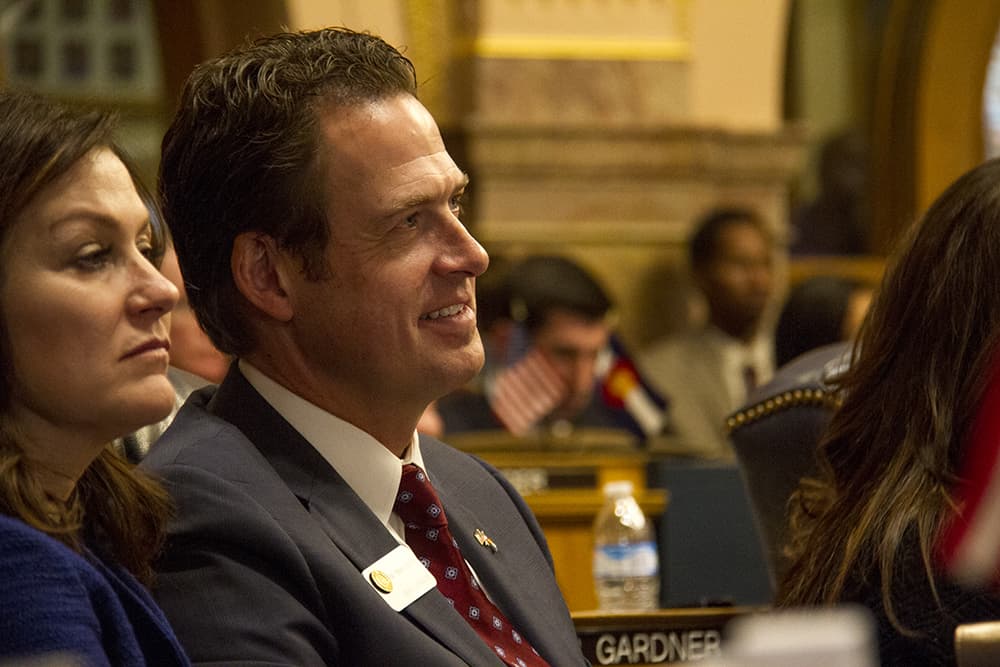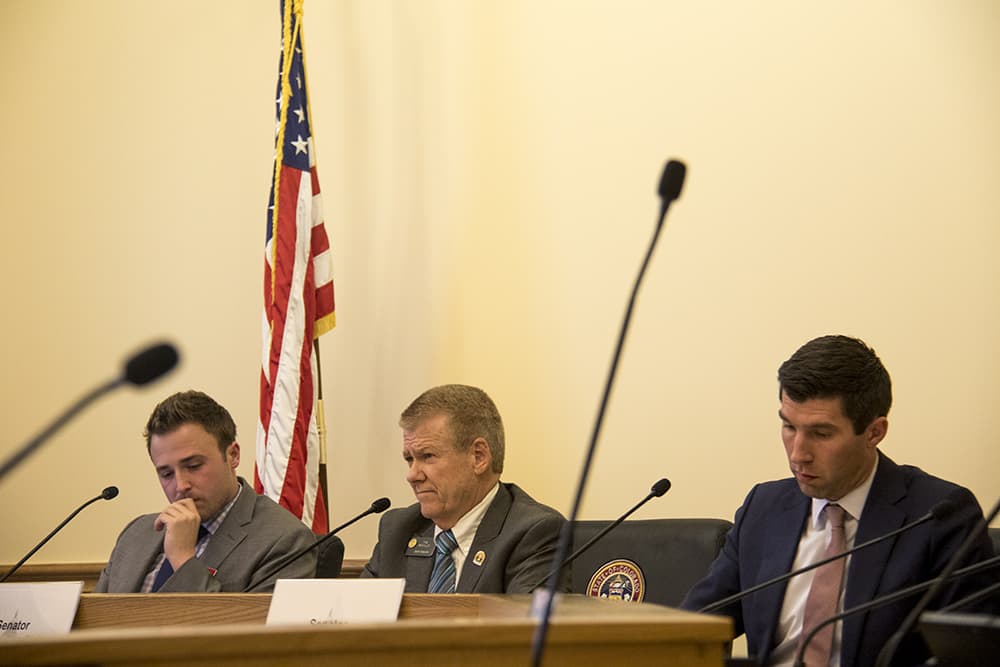
Ostensibly, state Sen. Jim Smallwood's bill to get rid of Colorado's health insurance exchange has nothing to do with Republican efforts in Washington, D.C., to repeal the Affordable Care Act.
"Let’s start with what Senate Bill 3 does not do, because there is a tremendous amount of emotion around this issue," Smallwood, a Parker Republican, said as he introduced his bill to the Senate Finance Committee Tuesday. "It does not repeal Obamacare. It does not cancel anyone’s health insurance policy. It does not cancel anyone’s subsidy. It does not change any of the rules around health insurance."
The idea behind Smallwood's bill is that Colorado's system is a waste of money and redundant with the national exchange, healthcare.gov. Colorado should decommission Connect for Health Colorado, and Coloradans who don't get their health insurance through their jobs or from Medicaid or Medicare can buy their 2018 policies on the federal exchange.
The problem is that no one knows if we'll have a federal exchange in 2018. President Donald Trump and Republicans in Congress have promised to repeal and replace Obamacare, but no one knows what the replacement will look like.
That makes the stakes for repealing the state exchange either very high or completely non-existent, depending on who is making which case.
The high stakes argument goes like this: Right now, we have no idea what's going to happen in Washington or what the national health care landscape is going to look like in a year or two. We need to keep Connect for Health so that people have something -- some way to get affordable health insurance -- if the national system goes away.
"With the erratic behavior of the federal administration, moving from this to that, to dismantle the local program seems extremely premature," said state Sen. Lois Court, a Denver Democrat. "If the federal government says we’re not going to do this anymore, we’ll just have to rebuild a local program again."
The low stakes argument goes like this: Connect for Health is just a web portal to shop for policies, but everything that makes it work -- the individual mandate, the subsidies that bring costs down for many consumers, the requirement that insurers cover people with pre-existing conditions, the rules around what and who is covered -- all of that is part of the Affordable Care Act, so if it goes way, Connect for Health won't be much good anyway.
"If the ACA is truly dismantled in Washington, and I pray every day that doesn’t happen without a replacement" -- at this point, the mostly anti-SB3/pro-ACA crowd in the hearing room started laughing and one person called out, "Talk to your senator!" -- "if the ACA is repealed and there is no subsidy anymore, those subsidies will not be available on any state exchange," Smallwood said.

Dozens of people who get their health insurance from the exchange spoke against the repeal.
They told the types of stories that helped make universal health insurance a driving goal for an entire generation of Democratic politicians and voters.
Sam Gilchrist, executive director of the Colorado AFL-CIO, described how his father sold insurance, but their own policy didn't cover his asthma, and how his upper middle class family was bankrupted by medical expenses.
Howard Paul spent years doing high mountain rescues, but what took him down was slipping on ice while walking his dog. The back injury resulted in $138,000 in claims. Now he has prostate cancer, and his drugs cost thousands of dollars a month. Meanwhile, his premiums have actually come down from the first year he signed up on the exchange.
Without the ACA, he said, "one, I'm bankrupt; two, perhaps I'm homeless; and three, ultimately I die. That's my story."
But does it matter if Paul's policy comes from a federal exchange or a state exchange? Paul said he wasn't sure. However, "we shouldn’t do away with our system until we know what happens with the parent legislation."
Connect for Health Colorado has had its share of problems.
Those who supported repeal mostly were people who were unhappy with their experience on the exchange. Speakers described spending hours working their way through a complicated website, only to be kicked out near the end, lack of clear communication between the Medicaid and insurance market sides of things, high premiums for high-deductible policies and limited choices.
The Longmont Times-Call recently reported that people in Longmont couldn't find any policies on the individual market that covered care at Longmont United Hospital, the city's only hospital. For at least one insurer, Cigna, that information wasn't accurately reflected on the website.
Tony Gagliardo, Colorado state director of the National Federation of Independent Business, advocated for the creation of a Colorado exchange in 2011 because his members wanted it, but in a recent member survey, 70 percent said they are unhappy with their choices and want to get rid of the exchange.
But getting rid of the state exchange won't necessarily bring more choice or lower premiums. Joe Hanel of the Colorado Health Institute, an independent organization that studies health care policy, said states using the federal exchange have also lost providers and seen costs go up, especially in rural areas.
Connect for Health has been the subject of numerous critical audits, mostly recently when the U.S. Department of Health and Human Services’ Office of Inspector General found the exchange misspent or didn't properly document nearly $10 million in grant money and said it should repay most of the money.
A fiscal analysis by the legislative council staff found that getting rid of the exchange would actually cost Colorado money in the short-term, including $3.6 million in IT costs to transfer to the federal system. Republicans question the long-term solvency of the exchange, while Democrats argue the state has already spent a lot of time and money improving the exchange. Clear Choices recently ranked Connect for Health the second best portal in the country, ahead of healthcare.gov, and the exchange is projecting a positive cash flow for this year. It makes no sense to scrap it now.

Connect for Health CEO Kevin Patterson said having an exchange in Colorado will give the state a springboard from which to respond to federal changes. He raised the idea -- also floated by the governor -- of Colorado forming the basis of a Western States regional exchange if the federal exchange goes away.
The exchange also provides jobs in Colorado for the people who maintain it, he said. If it goes away, customers will still pay a surcharge on insurance policies, but that money will go to the federal exchange instead.
"We are offering a Colorado solution to a Colorado problem, and we are seeking your support for keeping this in Colorado," he said.
But Sen. Jack Tate, a Centennial Republican, suggested the opposite, that more states moving into the federal system might "create a critical mass for a federal solution."
The bill passed out of the Senate Finance Committee on a party line vote. Republicans Tate, Tim Neville and Owen Hill voted yes and Democrats Court and Senate Minority Leader Lucia Guzman voted no. It heads now to the Appropriations Committee.
There were cries of "shame" and "boo" from the crowd in the hearing room after the vote, but opponents can take heart in knowing that the bill will almost certainly die in the Democratic controlled House.












